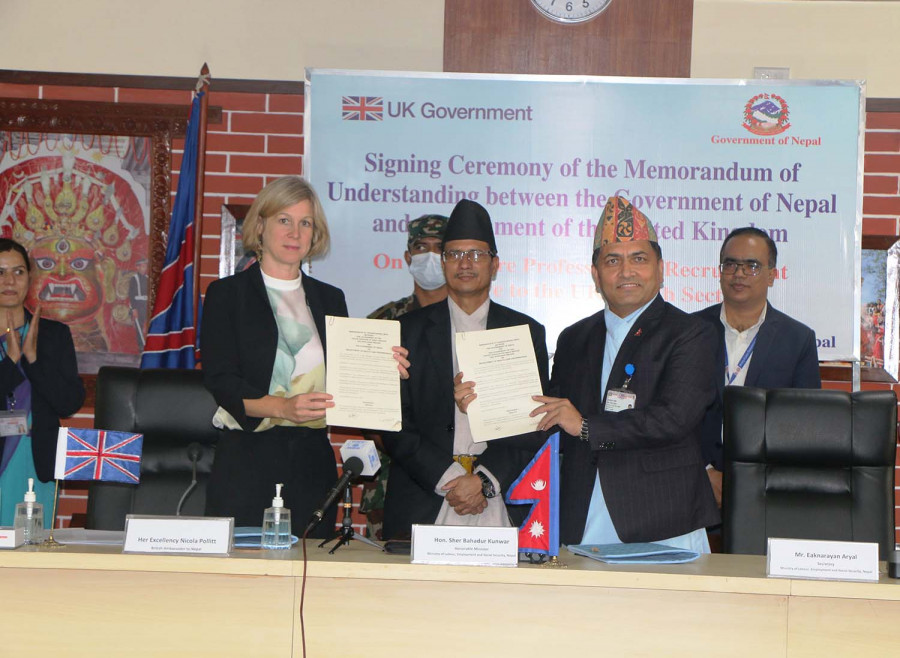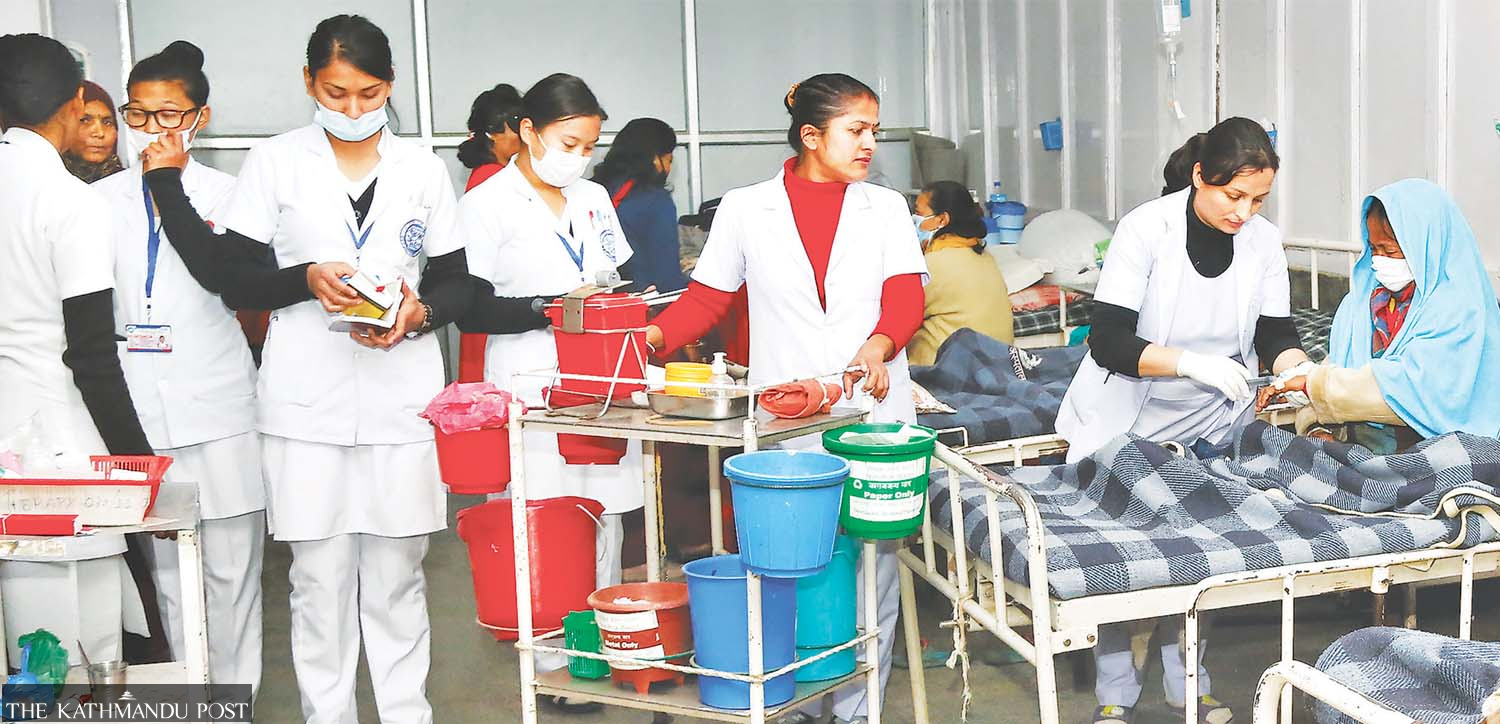
Eknarayan Aryal, secretary at the Ministry of Labour, Employment and Social Security (right), and Nicola Pollitt, British envoy to Nepal, after signing an MoU, in Kathmandu on Monday Photo courtesy: Labour Ministry
Nepal and the United Kingdom signed a bilateral agreement on health partnership on Monday, opening the door for Nepali nurses to work in the island nation.
Under the government-to-government arrangement, Nepali citizens aged between 20 and 45 years are eligible to apply for the high paying nursing job.
Potential candidates are not required to pay any recruitment fees.
Nepali citizens will receive the same rights, privileges, protection and dignity as health professionals from the UK, as per the agreement.
The annual pay for registered nurses ranges from Rs4 million (27,000 pounds sterling) to Rs4.8 million (32,000 pounds sterling), according to the statement issued by the Ministry of Labour, Employment and Social Security.
The number of workers that will be hired has not been ascertained, but Nepali officials say it is a piloting phase. The UK will gradually recruit health professionals other than nurses in the near future, according to the government officials.
The Covid-19 pandemic has caused increasing challenges for healthcare professionals globally.
According to reports, the UK is facing one of the most severe healthcare worker shortages in the world. The National Health Service, the statutory body responsible for public health services in the country, revealed that in the first half of 2019-20, more than 43,000 nursing posts were unfilled.
Not just nurses, the King’s Fund reveals that the National Health Service faces an overall shortage of healthcare workers across streams by a massive 100,000. If current trends continue, the number of healthcare workers required in the UK could reach 250,000 by 2030.
The UK eased the requirement criteria for hiring nurses from foreign countries to increase their recruitment amid an acute shortage of health professionals, according to international media reports.
Eknarayan Aryal, secretary at the Ministry of Labour, Employment and Social Security, and Nicola Pollitt, British ambassador to Nepal, signed a memorandum of understanding on Monday in Kathmandu to recruit Nepalis in the UK’s health sector, according to a joint statement released by the ministry.
“The agreement established a government-to-government bilateral agreement on fair and ethical recruitment,” reads the statement.
“Today, the UK and Nepal signed a labour agreement allowing recruitment of Nepali nurses into the UK health system benefiting the health sectors of both countries. Successful Nepali nurses will not need to pay anything for the recruitment and will enjoy the same benefits as the nurses in the UK,” ambassador Pollitt tweeted.
“Our healthcare professionals memorandum of understanding marks the start of a pilot phase,” wrote the British Embassy on Twitter.
According to the British embassy, the competitive application process would be launched by the first half of 2023.
Both governments, at present, are working to prepare an implementation protocol for the nursing category.
“It is a historic agreement,” said Thaneshwar Bhusal, under-secretary at the Foreign Employment Management Section at the ministry. “It will take at least three to four months for us to prepare the protocol to send Nepali nurses to the UK.”

Hopeful nurses will also be tested for their English language skills through the International English Language Testing System or Occupational English Test. Post File Photo
Officials said that the protocol would have been ready soon, but due to the upcoming general elections, it would be delayed.
A cabinet meeting on June 14 had given the green signal to the government to conclude a deal to send nurses to the UK.
The potential candidates must have completed Staff Nurse, Bachelor’s Degree in Nursing—Bachelor of Science in Nursing (BSc) or Bachelor of Nursing BN)—or Master’s in Nursing from a recognised institution.
They must hold an active professional licence from the Nepal Nursing Council and have at least two years' experience in a registered hospital in Nepal, as per the document unveiled by the government.
Hopeful nurses will also be tested for their English language skills through the International English Language Testing System or Occupational English Test.
They need to achieve a minimum score of 7 each in listening, speaking and reading, and a minimum score of 6.5 in writing in the International English Language Testing System.
The candidates have to achieve at least Grade B in the reading, writing and listening sections, and Grade C+ in the writing section in the Occupational English Test.
Moreover, educational qualifications received from a foreign accredited institution are also recognised if they allow registration as a nurse, according to the criteria document.
After being hired in the UK, the Nepali nurses will work as health care assistants.
The employer, the National Health Service Trust, will provide the accommodation cost for 12 weeks for the Nepali nurses.
The Nepali nurses, however, will have to pass an objective structured clinical examination. The objective structured clinical examination is used increasingly in nurse education to assess clinical skill proficiency at the pre-registration and postgraduate levels.
They must pass the examination within eight months of arrival in the UK in three attempts. “Otherwise, the visa will be revoked,” said the ministry.
After passing the objective structured clinical examination, the health care assistant will be assisted to complete registration with the Nursing and Midwifery Council of the UK. After that they can start working as a registered nurse at Band 5 or above depending on skills and experience.
While newly qualified and registered nurses start at Band 5, the most qualified and experienced nursing consultants and specialists can climb all the way to Band 9, the highest pay band, according to nurses.co.uk.
The nurses will also be entitled to join a wide range of schemes, including the National Health Service Pension Scheme.
After being fully registered with the Nursing and Midwifery Council of the UK, Nepali nurses will benefit from a year-long preceptorship education programme to assist them in their transition to a UK registered nurse.
Other benefits include publicly funded healthcare for the candidate and any dependent partners and children, and access to publicly funded schooling for children aged 4-18.
According to the World Health Organisation, the number of healthcare workers worldwide will fall short by a whopping 12.9 million in 2035. An ageing workforce, falling numbers in people entering the profession, early retirements, inadequate training and increasing demands from a growing and ageing population are some of the reasons attributed to the global shortage of healthcare workers.
According to the agreement, Nepal’s Department of Foreign Employment will work with the UK’s Department of Health and Social Care and its designated entity in the hiring process.
“Though the move will affect Nepal’s health sector in the long run, it is a good opportunity for our nurses to get work in the UK,” said Professor Mana Kumari Rai, who is the president of the Nursing Association of Nepal, the national governing body of nurses.
“While many nurses are unemployed, even those with jobs are paid little,” said Rai. “However, policymakers need to consider its long-term impact on Nepal’s healthcare sector too.”
Nepali nurses have been complaining about the pay structure in Nepal, which they say is labour exploitation. In Nepal, hospitals hardly pay Rs15,000 monthly, they say.
According to the Nepal Nursing Council, 72,550 nurses, 36,774 auxiliary nurse midwives, 847 foreign nurses, 645 specialists and 31 midwives had been registered in Nepal as of July 10 this year.
Several developed countries are short of health professionals to deal with emergencies, which was exposed during the Covid-19 pandemic.
"The government of the Maldives too has shown interest in hiring Nepali nurses," Bhusal had told the Post earlier. “We are trying to sign a bilateral agreement with the Maldives.”
Israel’s caregiving sector, mainly hospitals, nursing homes and day-care centres, opened for Nepali caregivers after a labour agreement was signed between Nepal and Israel on September 20, 2020.
Similarly, Japan opened up its labour market to Nepalis as specified skilled workers in March 2019 after the two countries signed a memorandum of cooperation to send Nepali workers with the status of residence.
Nepali migrant workers sent home Rs1 trillion in the last fiscal year ended mid-July, a record high money transfer to Nepal since Nepalis started going for overseas employment more than two decades ago.
“This is the 11th bilateral labour agreement Nepal has signed,” said Bhusal. “High paying jobs in developed nations are obviously an opportunity for Nepalis.”












